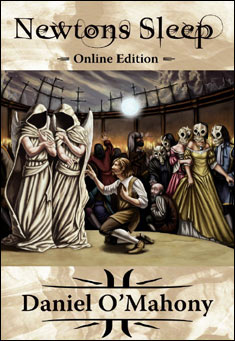Lately cannonballs have flown their arcs, leaving the crystal sky unbroken, while on Earth their traces are all too visible. Yet though Heaven has never seemed so far away, the divine is terribly closer. War on Earth presages War in Heaven; the struggle between the holy houses of Christ and their eternal Adversary has erupted among the living.
These are the signs of the last days: in 1651, a dead angel is found in a tree in Lincolnshire and a nymph rises from the waters of Kent; in 1642, a dying man is miraculously healed in the grave; in 1665, uncanny skull-masked doctors descend upon a plague house; in 1683, the French secret service unveil mirrors that show the futures; in 1671, Aphra Behn - she-spy and poetesse - infiltrates a gathering of alchemists; in 1649, the English kill their king, and history begins...
Excerpt:
Impelled as though in sympathy with the earth, a spittle’s-worth of dark humour slips from between the high branches of the tree into the mild air. So it plunges from its zenith, drawn by its yearning for the honest Lincolnshire lime. Thus does base matter descend, while pure spirit rises to join the light.
This hungry glob does not however find the soil, but impacts instead upon the head of a boy stretched out in quiet contemplation upon the ground at the foot of the tree. So a story is a-borning, one that shall bear repetition until Judgement and yet grow more grand and pregnant with each telling. Like a coin it shall be passed from party to party, its sovereign features slowly obliterated by the erosion of hands, until the markings be smoothed and unrecognised. Thus the fallen matter, which in fact most keenly resembles the manure from which all garden idylls spring, becomes in fiction a happier symbol; how sly that it should be the apple, that sweet fruit of bitter knowledge and ex-ile. But this is not Eden bounded by the Witham, and this boy, this youth, is no Adam. He is a child of nine summers with ***** on his brow.
Observe the boy, on his blanket of warm grass, in his cradle of grey tortured tree-roots, in his open-roofed bedchamber of hazy autumnal warmth. Observe his lank limbs, spread careless and empty of purpose. Observe his lolling head, the blond crop of his scalp, the beak’d face, the eyes oscillating palpably below the drooped lids. You might think him idle. You might think him asleep, and he is dreaming in his own fashion, but he is not idle. Sloth is not his sin; he has spent his day dialing (it having been determined that he is not fitted as a shepherd, neither as a merchant, and is therefore doomed to be that least practical of animals, an educated man). In his dreams he dials still, smoothing and shaping raw stone with a diamond-sharp blue blade. It is a more precise instrument than he has ever found in his waking life, making for a nicer dial on which ever finer gradients of shadow will reveal the stations of the hour in detail unknown even to the astrologers of Cathay or Egypt. These are, he contemplates in his dream, the oldest machines to be the work of man; only the heavens themselves turn on a finer and more perfect mechanism. In his dream he builds a great Palace of Time to contain all his dials, a plain wood house of ever-expanding wings and atria. This is Heaven and he will be its architect.
These are not the dreams of an idle child.
But he is a child of man and therefore sinful, and this sin – because he follows the true faith – cannot be wiped clean by the sanctified pisspot-fonts of Rome or all her whorish indulgences. If not sloth, then – what? It is not gluttony, his meat is on the brain not the bone. Lust, then? Lust has its smiling possibilities. These are cold years, but the summers are yet warm enough for the local children to seek out cool and lonely waters. They go in groups to bathe in the ponds or the streams, this lad among them, though he is neither an intrepid boy nor a healthy one and is content only to wade while his half-friends sink naked to swim below the line of the water. Once in jest they caught him and held his head under the surface, untroubled by his thrashing, releasing him at their leisure. His skull swelled when he broke into the free air, while blood and bile dribbled from his nose and mouth; he had swallowed from the stream, and was afflicted for a month by fevers and flux. They had most blasphemously baptised him, but while a-bed he had contemplated the quality of light that penetrated the murk, and found there a riddle that he turned casually in his mind. He will unlock it later; more often his thoughts turned to the bodies of his companions, friends and villains, sons and daughters alike; but this is the innocent curiosity of a child. As an adult he will lust for men – and also for women, but most often for men – but it will be a penitent’s flagellant lust, a tamed thing that inspires as much disgust as pleasure. It brings home proper Godly guilt as its harvest. Do not look for lust here; it does not drive him.
Oh, but there is pride.




